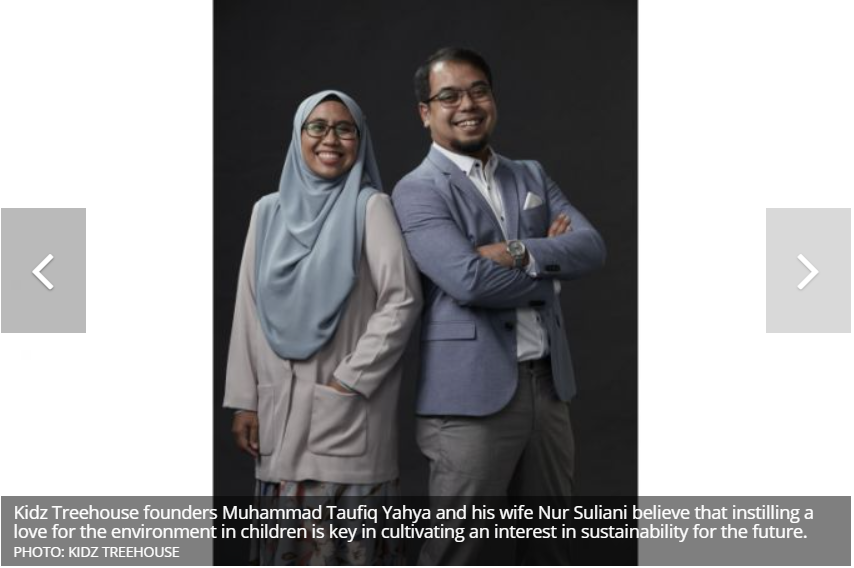At Kidz Treehouse’s Nature Campuses, little ones do not just learn their ABCs. They also learn to have an appreciation for the world around them.
Growing a future generation of eco change-makers was what nature lovers Muhammad Taufiq Yahya and his wife Nur Suliani hoped to do when they set up their chain of student care and enrichment centres in 2007.
“Apart from the coronavirus pandemic, we are facing an existential crisis of our time: climate change. We need to take proactive steps to educate our children on the importance of sustainability and taking care of Mother Earth,” says Mr Taufiq, who is Kidz Treehouse’s co-director.
The centre has its headquarters in Ang Mo Kio, with a community branch in Bukit Batok and student care campuses situated within 10 primary schools islandwide.
Mr Taufiq and Ms Nur Suliani, who have five children aged between 10 months to 10 years old, believe that instilling a love for the environment in children is important in cultivating an interest in big-picture issues such as sustainability and recycling, which would have an impact on the future.
“We wanted our learning approach to embrace the uniqueness of every child… to allow them to grow at their own pace and develop an appreciation for nature — which we believe will enable them to become confident, creative and resilient leaders,” says Mr Taufiq.
Under the Kidz Treehouse’s Forest School programme, pupils are free to explore and investigate their natural environment. During weekly outdoor sessions under the guidance of a facilitator, pupils aged four to seven are exposed to various activities designed to help them learn social and technical skills, such as teamwork and problem solving.
Mr Taufiq says this unstructured learning style helps prepare the kids for “21st-century challenges” such as climate change and the future of work. “We want (them) to develop empathy for their peers, learn how to collaborate with others, and develop resilience and grit.”
Leading by example
Kidz Treehouse also provides after-school student care services for those aged between seven and 12. Aside from homework supervision, character development lessons and enrichment activities, the centres incorporate environmental awareness as a core part of learning.
And the centres lead by example. Says Mr Taufiq: “For example, all student care centres follow environmentally friendly practices such energy conservation, waste reduction, paper reduction and controlled usage of single-use plastics.”
Kidz Treehouse also conducts an annual Eco Camp for young learners to pick up and apply environmentally sustainable practices. “In 2019, the theme for the camp was ‘Be a Hero, Go Zero’ — focusing on zero waste. The kids learnt to identify areas where waste could be kept to a minimum by making a conscious effort to use environmentally friendly products. At the end of the two-day camp, the 1,000 participants generated just 8kg of waste in total — that means only 8g of waste was produced per camper!”
During the circuit breaker last year, Kidz Treehouse supported non-profit organisation Student Care Association Republic of Singapore (STARS) by donating Care Packages to needy households. These care packages comprised necessities and a curated set of educational activities to keep children engaged indoors.
Mr Taufiq says: “Within a week, Kidz Treehouse was able to raise $7,000, allowing us to serve 200 families via our Care Package delivery service. More than 50 of our employees volunteered their time and energy to be a part of this campaign.”
For its efforts to make a difference, Kidz Treehouse was recently recognised as a Champion in the Brands For Good 2020 awards, under the Business For Good category.
The pandemic has also impacted the way children learn at Kidz Treehouse, with lessons being conducted online, and educational products and services being tailored to complement this new mode of learning.
“We created Club Kidz Treehouse, an interactive online learning experience conducted by experienced educators so parents can be effectively supported during their work-from-home arrangements. Lessons are conducted via Zoom on weekday afternoons, with activities ranging from book club reading to fitness sessions. Children were also provided with take-home kits and activity worksheets,” says Mr Taufiq.
Article Credit: businesstimes
